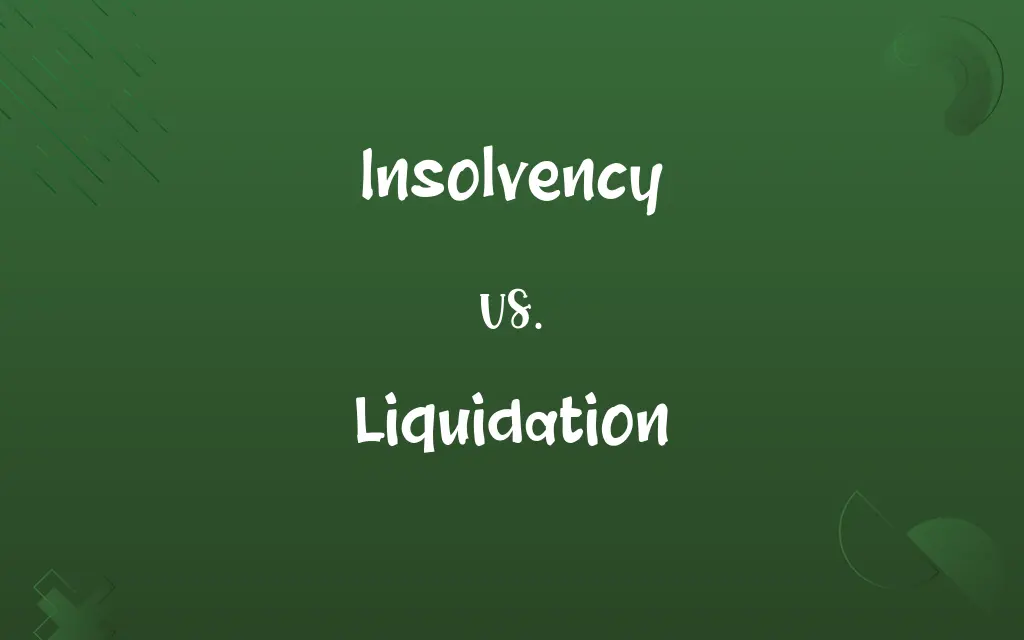Insolvency vs. Liquidation: Know the Difference

By Hifza Nasir & Dua Fatima || Published on March 1, 2024
Insolvency is a financial state where liabilities exceed assets, hindering debt repayment; liquidation is the process of selling assets to pay off creditors, often following insolvency.

Key Differences
Insolvency represents a financial condition where an entity or individual cannot meet its debts as they come due, indicating a lack of liquidity or solvency. Liquidation, on the other hand, is a formal process initiated to dismantle a company's structure by selling its assets, with the aim of distributing the proceeds to its creditors and, if funds allow, to its shareholders.
Dua Fatima
Mar 01, 2024
When an entity is insolvent, it might still operate while seeking ways to remedy its financial distress through restructuring or obtaining new financing. Liquidation signifies the end of business operations, with the sole purpose of realizing assets to discharge obligations.
Hifza Nasir
Mar 01, 2024
Insolvency can be temporary, potentially resolved through negotiation with creditors, refinancing, or restructuring of debt. Liquidation marks a definitive conclusion of the entity's existence, with its assets liquidated to satisfy claims based on a legally defined priority.
Hifza Nasir
Mar 01, 2024
The declaration of insolvency does not automatically lead to liquidation, as insolvency may be addressed through recovery strategies like debt restructuring. However, liquidation is a consequence of a decision or recognition that the business cannot continue, often following insolvency.
Hifza Nasir
Mar 01, 2024
Insolvency procedures vary, including voluntary arrangements and administration, focusing on recovery or reorganization. Liquidation processes, whether voluntary or compulsory, are focused on disbanding the company and distributing assets, leaving no scope for business revival.
Dua Fatima
Mar 01, 2024
ADVERTISEMENT
Comparison Chart
Definition
Financial state where liabilities exceed assets and cannot pay debts as they come due.
Process of dissolving a company by selling its assets to pay off creditors.
Dua Fatima
Mar 01, 2024
Purpose
To identify financial distress and seek remedies.
To conclude business operations and distribute proceeds to creditors/shareholders.
Hifza Nasir
Mar 01, 2024
Outcome
May lead to recovery, restructuring, or liquidation.
Ends in the dissolution of the company's structure.
Hifza Nasir
Mar 01, 2024
Process Initiation
Can be voluntary or forced by creditors through legal actions.
Initiated voluntarily by shareholders or compulsorily by creditors through court order.
Hifza Nasir
Mar 01, 2024
Impact on Operations
Business may continue while seeking solutions.
Ceases business operations and sells off assets.
Dua Fatima
Mar 01, 2024
ADVERTISEMENT
Insolvency and Liquidation Definitions
Insolvency
A state where debts cannot be met when due. Example:
The company faced insolvency after failing to pay several key suppliers on time.
Dua Fatima
Feb 27, 2024
Liquidation
Dissolution of a business through asset disposition. Example:
Liquidation sales were held to clear out inventory before shutting down.
Hifza Nasir
Feb 27, 2024
Insolvency
May result in reorganization or liquidation. Example:
The company opted for reorganization to escape its insolvency crisis.
Hifza Nasir
Feb 27, 2024
Liquidation
Aimed at settling debts by converting assets to cash. Example:
The liquidation proceeds were distributed among creditors as per legal priority.
Dua Fatima
Feb 27, 2024
Insolvency
A precursor to bankruptcy if unresolved. Example:
Insolvency proceedings were initiated to avoid bankruptcy.
Hifza Nasir
Feb 27, 2024
ADVERTISEMENT
Liquidation
May be voluntary or compulsory. Example:
Facing insurmountable debts, the board voted for voluntary liquidation.
Hifza Nasir
Feb 27, 2024
Insolvency
Financial distress signaling inability to satisfy debts. Example:
Insolvency led the firm to seek emergency funding options.
Dua Fatima
Feb 27, 2024
Liquidation
A final step in business closure. Example:
The decision for liquidation marked the end of the 50-year-old family business.
Hifza Nasir
Feb 27, 2024
Insolvency
Condition reflecting excess of liabilities over assets. Example:
The balance sheet review revealed insolvency, with total liabilities surpassing assets.
Hifza Nasir
Feb 27, 2024
Liquidation
The process of winding up a company by selling its assets. Example:
The court ordered liquidation of the assets to pay off the creditors.
Dua Fatima
Feb 27, 2024
Insolvency
The condition of being insolvent; the state or condition of a person who is insolvent; the condition of one who is unable to pay his debts as they fall due, or in the usual course of trade and business; as, a merchant's insolvency.
Hifza Nasir
Feb 27, 2024
Liquidation
To settle the affairs of (a business firm, for example) by determining the liabilities and applying the assets to their discharge.
Hifza Nasir
Feb 27, 2024
Liquidation
To settle the affairs of a business or estate by disposing of its assets and liabilities.
Hifza Nasir
Feb 27, 2024
Liquidation
The act of exchange of an asset of lesser liquidity with a more liquid one, such as cash.
Shumaila Saeed
Feb 27, 2024
Liquidation
The selling of the assets of a business as part of the process of dissolving the business.
The store is having a liquidation sale: everything must go as they go out of business.
Dua Fatima
Feb 27, 2024
Repeatedly Asked Queries
What is the main purpose of liquidation?
To wind up a company's operations, sell its assets, and distribute the proceeds to creditors and, if applicable, shareholders.
Hifza Nasir
Mar 01, 2024
Who can initiate liquidation?
Liquidation can be initiated by the company's directors, shareholders, or creditors through a court process.
Dua Fatima
Mar 01, 2024
What happens to employees during liquidation?
Employees are typically laid off, and their outstanding wages and benefits are treated as priority claims in the liquidation process.
Hifza Nasir
Mar 01, 2024
What triggers insolvency?
Insolvency is triggered by an inability to pay debts as they fall due, often due to cash flow problems or excessive liabilities.
Dua Fatima
Mar 01, 2024
Can a company recover from insolvency?
Yes, through debt restructuring, refinancing, or entering into voluntary arrangements with creditors.
Hifza Nasir
Mar 01, 2024
How is asset distribution handled in liquidation?
Assets are sold, and the proceeds are distributed to creditors in a legally defined order of priority.
Shumaila Saeed
Mar 01, 2024
What is administrative liquidation?
It's a process where an administrator is appointed to manage the company's affairs to maximize creditor returns, possibly avoiding total liquidation.
Hifza Nasir
Mar 01, 2024
What is voluntary liquidation?
It's a self-imposed decision by company shareholders to dissolve the company and liquidate assets, often when the company is still solvent.
Shumaila Saeed
Mar 01, 2024
Is liquidation always the result of insolvency?
Not always; a solvent company may choose liquidation for strategic reasons, though it's commonly due to insolvency.
Hifza Nasir
Mar 01, 2024
Can insolvency be resolved without liquidation?
Yes, through measures like debt renegotiation, asset sales, or securing new investment.
Hifza Nasir
Mar 01, 2024
How does compulsory liquidation work?
Initiated by creditors through a court order, forcing the company to liquidate its assets to pay off debts.
Shumaila Saeed
Mar 01, 2024
What's the difference between liquidation and bankruptcy?
Bankruptcy is a legal status of a person or entity that cannot repay the debts it owes, while liquidation specifically refers to the process of selling assets to meet those debts.
Hifza Nasir
Mar 01, 2024
What roles do insolvency practitioners play?
They manage the insolvency process, aiming to maximize returns to creditors and oversee the liquidation or restructuring process.
Hifza Nasir
Mar 01, 2024
Can insolvency lead to personal bankruptcy?
For individuals, insolvency can lead to personal bankruptcy if they're unable to satisfy debt repayment plans or agreements.
Dua Fatima
Mar 01, 2024
Are shareholders paid during liquidation?
Shareholders may receive proceeds from the liquidation, but only after all debts and creditors' claims are satisfied.
Dua Fatima
Mar 01, 2024
Share this page
Link for your blog / website
HTML
Link to share via messenger
About Author
Written by
Hifza NasirCo-written by
Dua Fatima






































































